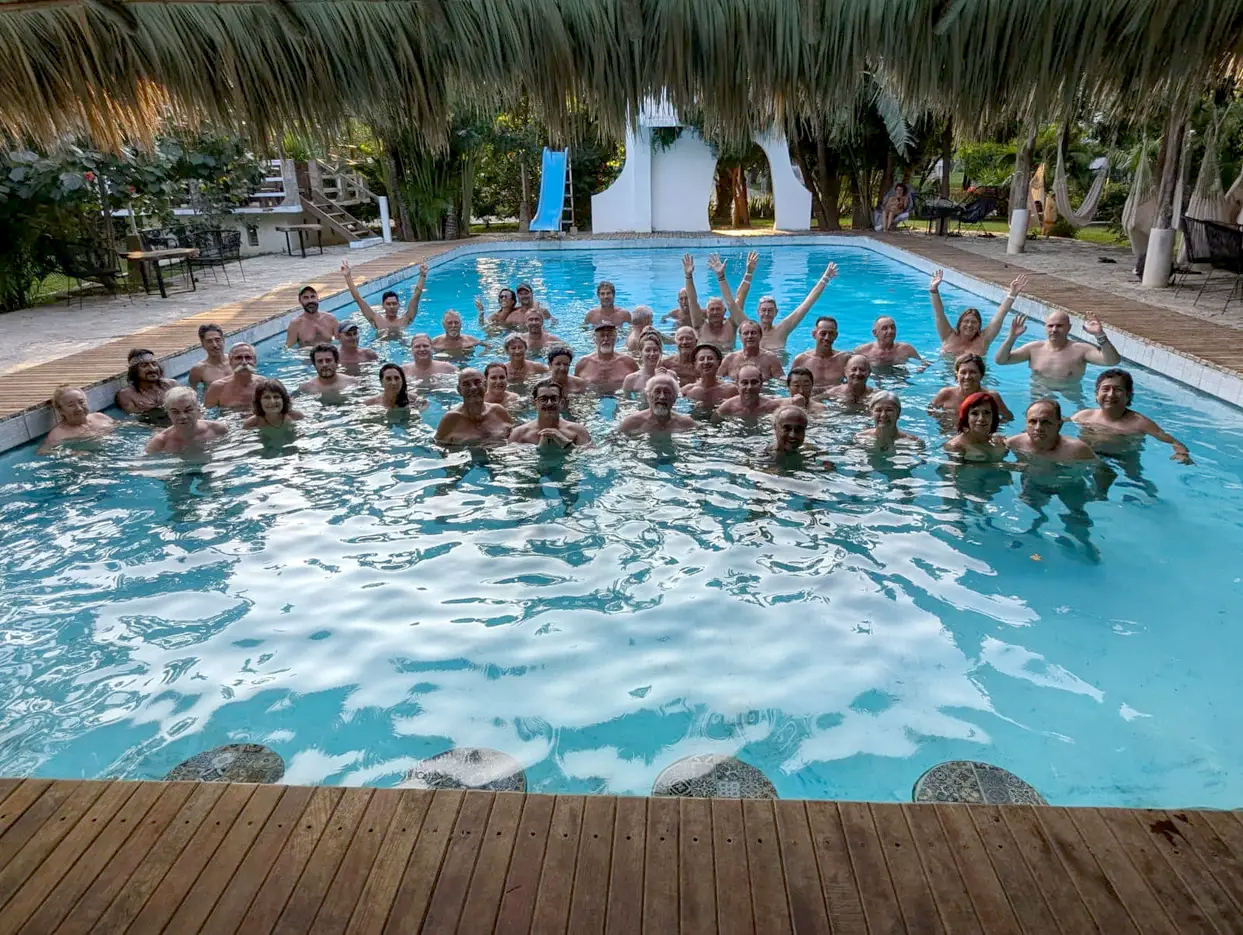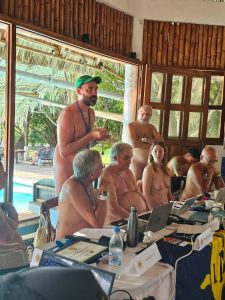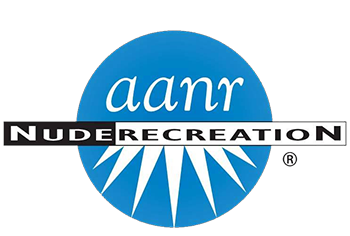
A Report on the 2024 INF-FNI World Congress
By: Evan Nix
From October 17th to 19th, 2024, naturist leaders and delegates from around the world gathered for the 39th International Naturist Federation (INF-FNI) World Congress in Zipolite, Mexico. Known for its embrace of naturism, Zipolite was an ideal venue for the event. The famous nude beach, the welcoming hotels and restaurants, and the charm of the local culture were highlights for me and my family, who arrived a few days early to relax. We spent most of our free time dining at Budamar, our hotel, or playing in the Pacific surf and Budamar pool with my five-year-old son, Eli.
The congress took place at Rancho Los Mangos, a campsite adjoining the Hotel Los Ángeles, just a short walk from the beach. Meetings took place in an open-air palapa surrounded by lush greenery, with wandering chickens occasionally adding some humor to the proceedings. With daily highs in the low 90s and equally high humidity, breaks often became group wade-ins into the nearby pool. Despite technical issues with the wifi causing some delays to the AI-powered translation system, the week was filled with engaging discussions, important votes, and great opportunities to connect with naturists from around the world. I had the privilege of attending as an observer on behalf of the BEACHES Foundation Institute, and it was also my honor to represent the American Association for Nude Recreation (AANR).
It was a pleasure meeting delegates from many countries, including Canada, South Africa, The Netherlands, Mexico, and others. The added presence of numerous naturist influencers and advocates outside the event enhanced networking opportunities, making it an even more memorable experience.
Broad Agenda and Key Discussions
 The Congress agenda covered a broad range of topics, including governance reforms, youth involvement, promotional strategies, and internal regulations. Key reports from the Central Committee, Law Council, and auditors highlighted the organization’s financial health, legal issues, and growth plans. Federations also shared their efforts in promoting naturism, sparking lively discussions on best practices. Special presentations focused on promoting naturism, engaging youth, and adapting the message to various cultural contexts.
The Congress agenda covered a broad range of topics, including governance reforms, youth involvement, promotional strategies, and internal regulations. Key reports from the Central Committee, Law Council, and auditors highlighted the organization’s financial health, legal issues, and growth plans. Federations also shared their efforts in promoting naturism, sparking lively discussions on best practices. Special presentations focused on promoting naturism, engaging youth, and adapting the message to various cultural contexts.
Several key decisions were made, including a proposal to streamline the process for convening extraordinary general assemblies to address urgent issues more quickly. There was also debate on rotating future congresses outside of Europe, with attention to balancing cultural outreach and financial feasibility.
Among the many matters discussed, Statutes §5, §6, and §8 were especially significant for their potential impact on American nudist organizations.
Statute §5: Recognition of Special Interest Groups
One key vote at the Congress focused on INF-FNI membership, specifically the recognition of Special Interest Groups (SIGs). Unlike traditional Member Federations that represent entire national naturist communities, SIGs focus on specific issues or aspects of naturism at the international level. These groups can range from advocacy organizations and educational bodies to for-profit entities like naturist resorts or businesses, provided they align with naturist values. Unlike federations, which are member-based, SIGs may operate without a membership base, focusing instead on advocacy or promoting niche aspects of naturism.
One such example is the BEACHES Foundation Institute, a non-member-based advocacy group working to promote body freedom and naturism on public lands—especially in the context of beach access. Before the vote, Martin Novoa, President of the BEACHES Foundation, introduced the organization, emphasizing its educational programs and legal advocacy in advancing naturist ideals without having a formal membership structure. His presentation illustrated the potential for these types of organizations to contribute significantly to the naturist movement.
The vote officially allowed SIGs to apply for recognition by the INF-FNI as a special affiliate, pending approval based on criteria set by the Central Committee. This opens the way for a broader range of organizations to engage with and support the global naturist movement, even if they don’t fit the traditional model of national representation.
Statute §6: One Federation Per Country
A vote was held on whether to maintain the long-standing rule allowing only one federation per country. This principle has been central to the INF-FNI’s structure, ensuring that each nation has a singular representative body. However, the proposal at this congress sought to modify this rule by potentially allowing multiple federations from a single country to hold membership in the INF-FNI. The rationale for this change stemmed from increased interest in diversifying naturist representation, particularly in larger nations where multiple federations may offer different visions or approaches to naturism.
Proponents of the change argued that allowing multiple federations would provide greater inclusivity and reflect the diversity of naturist perspectives within a country. Opponents voiced concerns that such a change could lead to fragmentation and undermine the unity of representation at the international level.
In the end the proposal did not pass. The decision to retain the traditional one-federation-per-country rule prevailed. However, the Congress did approve a mechanism allowing a second federation to apply to replace an incumbent with the approval of the general assembly, which convenes every two years. This new mechanism provides a path for federations to challenge the status of the existing representative if they believe they can better represent the naturist movement in their country. This change is historically significant for the INF-FNI, offering greater flexibility in how national representation is determined.
Statute §8: Membership Fees and the Future of AANR’s Involvement
One of the most significant discussions at the Congress revolved around Statute §8, which addressed the structure of membership fees and the possibility of offering opt-in membership to the INF-FNI. This vote was critical for AANR, which has been absent from the INF-FNI since 2009 but had expressed interest in rejoining under a system where members could choose whether to opt into INF-FNI membership.
The proposal outlined four options:
● Option 1: Mandating 100% membership, where federations would pay for INF-FNI memberships equivalent to their total number of members. This option represented the historical status quo, or no change to the existing rule.
● Option 2: Allowing federations to only pay for the memberships they sold, offering members the choice to opt in or out.
● Option 3: Automatic INF-FNI membership for all members, with federations paying based on their total number of members, effectively removing the “stamp” method, but still not addressing AANR’s desire for an opt-in system.
● Option 1B: A newly proposed option permitting federations to request exceptions by approval of the general assembly, allowing them to offer optional INF-FNI membership on a case-by-case basis.
Since options 2, 3, and 1B represented a change to existing rules, they required a two-thirds majority to pass as opposed to a simple majority. With such a high bar, the vote fell just short of success. Initially, 61% voted in favor, and after further debate and a motion to vote again, a second ballot garnered 65% support, missing the required threshold by a mere 1.6%. This close vote left many disappointed, especially those supporting AANR’s re-entry and the Dutch Federation, which had been operating under the violation of the 100% membership rule.
In the aftermath, the Netherlands was granted a two-year grace period to continue under their current system until the next General Assembly in 2026. While this gave the Dutch Federation temporary relief, AANR’s hopes of rejoining the INF-FNI under an opt-in system were dashed. After speaking with multiple attendees after adjourning that day, it became clear to me that the outcome was seen as more a result of European federation politics than any desire to exclude AANR, with many attendees expressing strong support for AANR’s return. Despite the setback, discussions about potential workarounds emerged after the meeting adjourned, highlighting continued interest in finding a path for AANR’s involvement in the future.
Elections and Leadership
One of the highlights of the Congress was the election of key positions within the INF-FNI. In most cases, the elections were unanimous, with only one candidate running for each role.
Stéphane Deschênes was re-elected as President, Dominique Dufour retained his position as Treasurer, and Laurent LUFT was re-elected as the Europe Assessor. Other uncontested positions filled included members of the Law Council and auditors. All of these positions were re-elections, with the candidates being retained in rolls they already held, excepting just one contested election.
The only contest was for the newly expanded Public Relations/Communications Officer role. Two candidates vied for this important position: Heather Cheney from the U.S., who is an INF-FNI member through Canada’s FCN-FQN, and Hector Martinez from the Mexican Federation. Both candidates were nominated by their respective affiliate organizations. Although Heather was not in attendance, she delivered her candidacy speech via pre-recorded video, while Hector gave an impassioned speech in person about his vision for INF-FNI’s communications strategy. Ultimately, Hector won the election with a decisive majority, securing 136 votes compared to Heather’s 30.
As the Congress drew to a close, attention turned to selecting the host country for the next General Assembly in 2026. Hungary was chosen by a significant margin over Serbia, and we can look forward to another important gathering in a country with a rich history of naturism.
Personal Reflections and Address
At the end of the Congress during the discussion of new business, I had the honor of addressing the delegation on behalf of AANR. Speaking to such a distinguished group of naturist leaders, I expressed my gratitude for the opportunity to attend and represent AANR, while reaffirming our continued interest in rejoining the INF-FNI, despite the outcomes of the recent votes. My remarks were warmly received, and after the proceedings, I was met with kind words from many attendees.
By all accounts, this year’s Congress was a marked departure from the more contentious debates of past years. While disagreements and disappointments still arose, the overall tone was one of respect, camaraderie, and a genuine spirit of cooperation. Many decisions were met with near-unanimous support, and even when differences remained, the discourse was amicable and kind. Although drama is often unavoidable in such settings, it never escalated to the point of overshadowing the positive atmosphere.
The 2024 INF-FNI Congress was a week filled with important discussions, key decisions, and the strengthening of global naturist relationships.
While certain votes presented challenges for AANR, there was a consistent expression of support for the organization to rejoin the INF-FNI.
This highlights the desire for AANR’s involvement on the global stage, even though the vote regarding membership rules did not pass. Importantly, workarounds were suggested, offering hope that AANR might still find a way to rejoin under terms that suit both parties.
For the BEACHES Foundation, the recognition of Special Interest Groups (SIGs) was a key takeaway. As a non-member-based advocacy organization, BEACHES now has the opportunity to seek formal INF-FNI recognition, which could strengthen its influence and further its efforts around beach access and body freedom. The Congress demonstrated that both traditional federations and emerging, focused organizations like BEACHES have roles to play in shaping the future of naturism.

